| |
Friday, December 28, 2001
 Central California Central CaliforniaThe Now-That-Christmas-Is-Over-Card
Every year my reaction to the holiday season comes to me slightly differently. One year I'm Santa, and I just love cutting through the last minute stress to surprise someone. I've time-traveled to the Middle East of long ago, and listened for the murmurs of worshippers -- listened also for helpless yet noble cries from within straw and weeds. But do you know someone who just can't stomach Christmas, for whatever reason, a soul temporarily deadened by the festivities, rather than enriched by them? That has been me too. Each year I'm someone else in winter, if only slightly.
But I'd never cross the line into amnesia of the season. That would scare me. It would hurt, like losing an arm or an eye would hurt, both immediately and consequently, each in a different way. If only to insult it somehow, I'd keep my ties to the season's festivities, though usually the feeling is deeper and the significance more positive. It would be like self-amputation to let it all go, and in doing so I'd color my childhood crawls a darker tone, and the passionate young years would be thin cardboard instead of ribboned packages wrapped in silver and gold. Don't we all like gifts?
It's night time, Christmas day, and I'm coming down. This year I was father-trying-to-make-son-happy, and a few other minor characters. No cynicism, but no real depth of emotion either. It was good, a regular year, maybe better than a regular year. Whatever spell began in December now slowly begins to slip away. As it fades, I sense it better than when I'm lost in its soft murmurs and expanding cheer. In these quiet moments after the holiday I am always the same, and no matter what happened where to whom that year, so is the mystery of Christmas.
See poetry in Slow Trains Issue 3
Saturday, December 22, 2001
 Imagine me speechless, stunned to silence. Talking all day, all night--- what's wrong, where are you, we'll be right there, go there, go there now, go there faster, go, go, go…. Jaded, cynical, not happy about working Christmas and New Years, bah humbug me. What could possibly shut me up?
I had asked my gangsta-rap, ass-hanging, jean-dragging, more often than not monosyllabic son where he was going.
"To the mall," he said. "To buy Sean a present."
"You're buying your boyfriend a Christmas present?" I say this just so he'll respond, slowly and clearly so I'll understand, being in his eyes old and thick as a plank.
"Mother - he -- is -- not -- my -- boyfriend." He makes those little air quotes when he says "boyfriend" to be sure I've got it this time. "We have "Secret Santa."
"Secret Santa?" Hmm…The Bloods, The Crips, The Secret Santas? They dress up in long white beards and balaclavas then run about knocking off convenience stores and stealing little old ladie's purses?
Hormone-fueled "Ho-ho-hos" echoing down the snowy side streets that are their winter turf.
"We draw names so no one knows who's buying for who. I've gotta go. I'll be back."
I stand there speechless, head cocked like one of those little bobble-headed dogs you used to see in the back windows of cars.
But I'm thinking now -- not talking -- thinking. I'm thinking of diapers and baby powder; of faith and innocence. I'm thinking of a pair of shoes at the top of my closet; size one, scuffed on both toes. I'm thinking of Ninja-Turtles, Transformers and Lego. I watch him walk up the street, and I'm thinking I'd like to pull those pants up like I used to when he was two. Just one finger in that back belt loop and I could yank them babies right back up where they belong.
Mostly I'm thinking I'd better get a move on. Christmas is coming and I'm not anywhere near ready. And maybe I'll wear those fake reindeer horns to work on Christmas…..
Tuesday, December 18, 2001
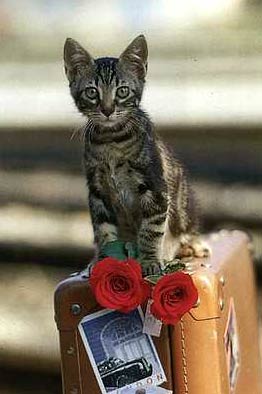 The Winter Issue of Slow Trains arrives on the solstice, packed full of gorgeous writing, ranging from a Hangover Sestina, to a visit with Theda Bara, to a remarkable childhood memoir in the Temple of Air.
Friday, November 23, 2001
 The Woman & the Lotus She is leafing through a book in the library with all the nonchalance of a rubber tree brushed by a steady wind in a valley in Vietnam. With the lilting half-syllables of someone who has to pick up the language at fourteen, she turns & says, "Robert, you know, in my country..." pointing to a photograph in the book on water lilies, "...this is the lotus, & my grandfather would put tea in the flower, leave it overnight while it closed, & gather it again in the morning. It smells so good. "
I watched her eyes reach back through that Proustian sensation to childhood. Now, she's a senior majoring in chemical engineering. "..&, you know, Robert, my people would feed the horse the tea, then kill the horse. They take it out of the stomach in a few days. It is very expensive."
Lan told me once that her name means "orchid." Another time, after showing her some pieces I'd written about my wife & undergarments, or other women observed on the street & what they might have worn, Lan paused, & in her own way, intoned, "This weekend I must go shopping?, to make more poems?, for the world!"
Monday, November 12, 2001
 The Chinese character for poetry combines word and temple.
Sunday, November 04, 2001
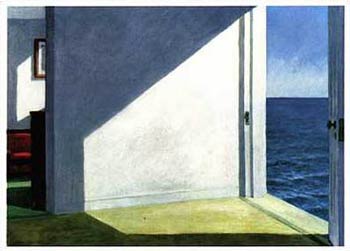 The Elevator of the Dream The Elevator of the DreamWhen I woke I noticed the moon I'd dreamt of, & tracked down, still there on her face through the skylight. Her heavy-breathing, sleeping face covered in a veil of light lighter than sheets on her body. I laughed for no reason, other than joy. So there we were quietly awake, & I told her of my dream where I took the elevator up to the sea, & tracked the moon in two different stages. Then, stood in front of the same elevator seeking the sea again, which you must know how difficult that is, to find the same thing a second time in the dream. It barely returns evanescent, at best. Two young girls in front of the elevator as well, exercising & talking to each other, would-be contortionists of Beauty. One asked, "How did you like seeing the sea?" I replied, "Are you 'ddressing me?" leaving out the "a" with a Freudian slip in the dream, leaving me tongue-tied & embarrassed before these dancers. My wife said the source of the dream must have come from the two young girls we saw the day before coming out of the sea dripping wet in their bathing-suits. An image I'd forgotten, but certainly did not want to forget: two girls at the end of a November day coming out of an Atlantic my wife pointed out was rose aglow. I could not help telling the two young boys playing with their toy motorcycle to stop, & take a look at that rose color on the water, to intrude on their make-believe world, & point out the possible Beauty of real life. The two days, the love of the two days, the one from the view of the seawall, & this day with her, face veiled in moonlight, joined as if in marriage by the dream. That yesterday, when I noticed all the houses had removed their wooden ladders to the sea, & this day, when I stepped out of the elevator of the dream.
(See poems in Slow Trains Issue 2 and the September 11 section)
Tuesday, October 30, 2001
 Loveland, Colorado Loveland, ColoradoLoveland is open. Keystone is open. These are the words we wait for every fall, as the ski resorts vie for the earliest opening day. Loveland is open and I'm here, one hour from Denver, cool and windy even while Denver is 70 degrees and sunny, with the petunias still in bloom.
First ski run of the season -- there's nothing quite like it. The snow is mostly manmade on a small natural base, but it works. No crowds, cheap lift tickets, all of four runs open. Vail and Aspen will open for tourists and money just before Thanksgiving, but us diehard locals get an extra month in early season. Several disabled skiiers are here for the opening -- Colorado is home to the National Sports Center for the Disabled, at Winter Park Resort. When someone I know is troubled, or feels like their own struggle is too hard, I recommend they come sit on the lodge patio with me at Winter Park for an afternoon and watch some of the disabled skier competitions and know what inspiration is.
You would think that everyone in Denver would ski or snowboard, but they don't. It's too hard. It's too expensive. It's too far to go… I might hear. But it's a primal experience, of which we don't get enough in this century, and you only have to hold a faux-warrior mind for a short while to conquer the physical challenges of the slope. My teenagers are wild snowboarders, flying through the air, landing tricks -- rodeos! Backflips! 360's! 720's! -- but not today. Today it is enough for all of us to see the first runs open, to slide gracefully down the hill in t-shirts and sunburn, and to look forward to another winter of adventure in the only white powder we should all get to know.
(See Better Angels in the September 11 section)
Monday, October 22, 2001
 La Jolla La JollaI am waking up every morning with the song "God Bless America" in my head. Although I am not too fond of forced patriotism, this one I like, particularly during the seventh inning stretch of baseball playoffs. When I was younger and followed the Grateful Dead, we called it the "Dead in your head," whatever song was replaying in your subconscious, because we lived inside the music. Who would ever have dreamed that some day I'd replace Sugar Magnolia with home sweet home?
Tuesday, October 16, 2001
From the seaport town of Scituate, Massachusetts
The Boat in the Sky Sailed Past
Restless, I got up from bed, & walked downstairs in what seemed a watery light. Troubled as much as restless, I'd wrestled with the problem for hours to no avail. Perhaps a scholarly diversion could keep my mind off a family dilemma, so I took along the book I'd been reading in order to help imagine an appropriate memorial to those lost in September -- Erwin Panofsky's, Tomb Sculpture: Its Changing Aspects from Ancient Egypt to Bernini. I read for a while, exhausted, fretted some more over the personal crisis, then gave up. Defeated, I gave up trying to solve the problem, which only then allowed sleep like death to take over. Finally, woke on the couch, my heart calm. Went upstairs to join my wife in bed, when through the skylight I saw the boat of Dionysos floating slowly across the sky in the watery light. Slept, again, & dreamt: I was driving my daughter's car, the law following me. Ahead of the law in my daughter's white car. I knew I'd drunk a cup of red wine from the bottle of Copolla Rosso still in the back seat. Drove on, cop car in the rear-view mirror. Entered a wooded area, & found a clearing. Shook the law off. When I woke the image of the moon as boat in the sky, which Panofsky says evolved its iconography, between 275-350 AD, from "transportation to salvation," had sailed past the window frame into vast, untroubled waters.
(See poems in Slow Trains Issue 2 and the September 11 section)
Thursday, October 11, 2001
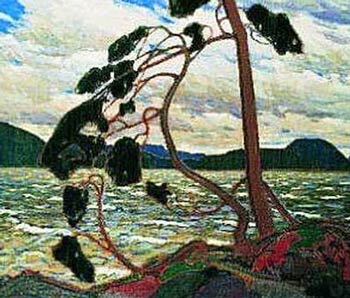 Santa Cruz Santa Cruz
Sometimes I go about pitying myself
and all the time
I am being carried on great winds across the sky
--Chippewa
(tr. Robert Bly)
Monday, October 08, 2001
Denver
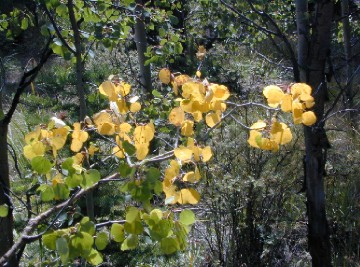
There are 948 million aspen trees in Colorado, each one spinning
toward gold tonight. Sacred space, state of grace, hold me
safe on the border of free falling darkness. Seasons
change; friends remain. Numbers are important
things in this world; aspen leaves; days;
tears; trees; one more year.
Read fiction in Slow Trains Issue 2
Wednesday, October 03, 2001
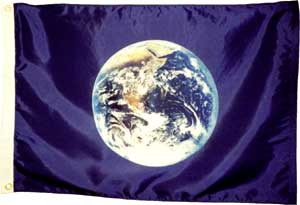 La Jolla La JollaI fly the Earth flag outside my home, and a number of people have questioned me on this. "You should fly the American flag above it," they often say, and I wonder, why? What could possibly matter more than our allegiance to this planet? The Earth flag is flown at the United Nations, the north and south poles, even at the (Russian) Mir Space Station -- surely it is good enough for ordinary citizens. I live by the Pacific Ocean, and I am reminded every morning when I swim of the forces of nature, the inexplicable power of this earth, and of the beauty and wonder we are each caretakers for during our brief lifetimes. I fly the Earth flag outside my home, and I have a vision of every person around the globe doing exactly the same thing.
Monday, October 01, 2001
 Individual IndividualThe week spent wanting to write about the papermaking process, my love for paper, recalling the dream last month in which a papermaking vat with moveable screens operates through the clumpy mixture. During the dream I have the feeling it's the greatest machine ever made. Reflecting on it, it seems related, a distant cousin, or offspring of Duchamp's La Bruit Secret, that found ball of twine caught up between steel-bolt pillars & brass plates, indestructible in the eye of the beholder.
What I'd forgotten was the accompanying dream: my daughter holding a beautiful piece of paper, veins of rag content visible in the sheet. She's smiling at her own accomplishment, constructing it as an assemblage tied to a wooden dowel (weeks later she brought home various lengths of rushes). It's the flag of a country of one.
(Read poetry in Slow Trains Issue 2)
Tuesday, September 25, 2001

The first movement was walking, so people walked.
Then came the car, so the population drove.
Later arrived the airplane, and people filled airports and flew.
To walk costs almost nothing.
Driving is a higher commitment to a budget of gas,
insurance, cleaning, and repairs, yet the common man
can manage it.
Flying is the most expensive of all, only a few
own a plane, and it's consider a luxury to just buy a ticket.
If you fall while walking, you can expect one person, if any,
usually someone who loves you, to help you
up off your bleeding knees.
If you crash your car you can expect a crowd,
bystanders, an ambulance, paramedics and police.
But if you crash a plane,
thousands will rush in,
to help if they can, to know why
and soon the world knows and anyone
and everyone will wade through blood and jet fuel to help.
Workers, proud to be chosen, are assigned to pick each piece up,
then catalog it. No expense is spared, when cleaning
a plane crash, and the world gives freely to it. And if a single man
falls while searching the rubble for parts
there is always more than one person there to pick him up.
It's the most beautiful thing I've ever seen, the way
they brush him off, stand him up, and wait a second
to make sure he doesn't stumble again.
(See poetry in Slow Trains Issue 1)
Thursday, September 20, 2001
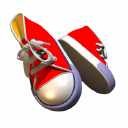 From Toronto to Thunder Bay From Toronto to Thunder BayWhen I went back home, I took my daughter to the creek I used to play in, and I took her to the hill I used to slide down in the winter. Devil's Hill -- you'd fly down, teeth knocking, seeing double, and jeezuz boy, your arse'd be froze, tail bone cracking all the way. You'd fight over the aluminum disc called The Flying Saucer -- if you lost and didn't have a piece of cardboard, you'd just roll down, end over end. The hill doesn't seem big enough now to fit in my final "end" If I tried it now, by end/over I'd be down, flat out on the now-paved rollerblade trail at the bottom.
We'd be gone all day in the summer back then. Cooking crawfish from the creek in rusty tins, skidding down the river-slicked rocks on our skinny kid butts, filling our lungs and holding our breath under the water in an effort to evade the deer flies that bit you anyway when you came back up dizzy and gasping. You had to hide the cuts on your feet that you got climbing the rocks you weren't supposed to be climbing. You could keep your Keds on, but if they came home wet, there wasn't much use in trying to say you weren't in the creek .
How do you explain this kind of freedom to a big city kid? An all day freedom. A "Mom, we're going to the bush" freedom. No video games, no guns, no gangs; just a summer of fresh air, wild raspberries and the occasional grass fire for excitement.
Maybe if you don't know what you're missing, you don't miss it. And maybe my daughter will look back on her childhood as fondly as I look back on mine. I hope she does. But I can't give her the freedom that I had, because there are some days now when the world scares me too much.
Wednesday, September 12, 2001
September 12

 Wednesday, September 12, 2001 5:01 AM EDT New York City Dear Ones -
It's the middle of the night here in New York, a city which doesn't generally sleep even under the best of circumstances and which is certainly lying awake tonight. I have walked and ridden my bike around the city today. I have seen both rivers, which are still there. I have seen the hollow mushroom cloud where the longest arms of my city's beautiful skyline once reached to the clouds. I have seen the stunned crowds on the streets at 10:30 AM and the erie emptiness at 10:30 PM. The city is quiet now except for the sirens from the tireless emergency vehicles. But the city is still here. That's primarily what I want to tell you tonight. We are still here -- horrified and stunned and shaken -- but still here.
I've been thinking today about a joke I heard a New York comic deliver years ago, after the first World Trade Center bombing. He said, "These terrorists tried to blow up the World Trade Center because they wanted to send a shock wave through New Yorkers. Hell, that's not how to send a shock wave through New Yorkers -- we walk around expecting stuff like that to happen half time anyhow. If you really wanna send a shock wave through New Yorkers, come to our city in the middle of the night and finish up all the construction work on the Queensborough Bridge -- that'll shock us, for real." Gallows humor, yes, but there is something to it. Namely, that even in the midst of this unspeakable tragedy, New Yorkers still insist on being...New Yorkers. An endless crowd of busy, bossy, thoroughly engaged, sarcastic but somehow holy wisecrakers. Which means that the life force does not stop, refuses to stop, cannot stop. The homeless are still out there tonight, picking up spent cigarettes off the street and jonesing for a cup of coffee. The subways and busses have inched back to life. Young recruits from the Police Academy -- dressed in their grey almost-cop uniforms -- stand in every intersection, keeping traffic organized and reminding the dazed civilians who sometimes simply stop moving in the crosswalks that the laws of gravity and physics don't stop just because of an appalling act of terrorism, so move it along, people. Storefronts are closed everywhere, but not universally -- there seems to be one deli and one pizza joint open on every block, and these places have become shelters and churches, where people come to find both food and comfort. The real churches are still open, too.
I met a doorman from Queens tonight who had been guarding his building since 7AM. It was almost midnight, and he was bleary-eyed and weary and nobody was coming in to take his post, but he refused to abandon his building. "Seventy-six apartments in there," he said, gesturing behind him. "I'm not letting down my guard. No van or truck is parking in front of this building tonight, I'll tell you that. I don't care if I have to go after someone with a baseball bat -- nobody's messin' with this building." I felt safer somehow knowing that this one piece of New York was in his hands.
A man on his cellphone, complaining to a friend as he walked down the street, gave those around him the first smile of the day with this line: "Damn! Last week my wife was tryin' to kill me, now the A-rabs are tryin' to get me." He seemed equally unthreatened by both. And here's the oddly most comforting assurance that business continues as usual in New York tonight. I locked my bike up to a parking sign for an hour this evening and came back to find that someone had stolen my back tire. See? See how we ALL -- even the pettiest little theives among us -- insist on perservering, even in the face of tragedy? I swear, I found inspiration in even that. The city cannot shut down, you see, anymore than life itself can shut down. As long as we live, we move. And that movement is our deepest salvation and greatest healing.
I went to give blood today at Bellview hospital and found they had more volunteers than they needed. A line of people four-deep wrapped around the block. It was the same thing at every hospital in the city. Crowds of people of every age and nationality patiently waiting for the chance to give up their very blood to help save lives. The radio in the pizza place tonight said there were too many people down at the site of the collapse -- every volunteer fireman within 100 miles, all trying to help. They are turning people away, but we still show up because we want to help. We are all trying to help. I passed a massive triage center today that had been set up on the Hudson River. A vast assemblage of ambulances were lined up outside, still and waiting, and there were medical personnel everywhere. But only medical personnel. Nobody in need of treatment was to be seen anywhere. A young doctor with tired eyes told me, "There are hundreds of doctors here, but no patients. We've been here all day, ready to help, but they just aren't finding survivors down there. Everybody's gone. All gone."
Gone, but not completely vanished. The mushroom cloud that covers the southern tip of my city? That's where all the people are. The countless thousands of them. Their lives and their souls and their dreams are hovering above us in a white cloud of dust, which was very difficult to distinguish this afternoon from all the other fluffy white clouds in the beautiful blue sky. Exactly the same color, exactly the same shape. Just a little bigger and a little closer to earth than the other clouds. A little closer to us. There has been a gentle southward breeze all day, taking it all out to sea. The air smelled like autumn tonight for the first time.
It is late now, almost dawn, and I should go to sleep. I don't know what more I can do tonight except what I have done all day -- continue to believe in God, continue to believe in New York City and to steadfastly refuse to hate. Something unthinkable has happened here to our humanity, but all I saw on the streets today was calm, compassion, perserverance and resolve. What I will try to remember most from September 11, 2001 is this moment. I was in line to give blood. Someone from the hospital came out and made a loud request that anyone with O-positive or O-negative blood would please step forward. "We need your blood," said the nurse. "We need you." The message shot back through the crowd and the masses stirred and from within the ranks of us emerged these universal donors. One at a time they pushed forward -- a young black man, a professional-looking Asian woman, an old man in a yarmulke, some hispanic students, a city bus driver, etc. With reverance, we all parted to let them pass. They seemed for that moment to be the most important people in New York City. They shared nothing in common with one another except the same blood. A blood that can save any life because it does not discriminate. A universal blood. What runs through their veins is our best and only hope. God bless them.
Please pray for peace.
I love you all,
Liz
(author of Stern Men)
Tuesday, September 10, 2001
Denver

"Hey Andy did you hear about this one? Tell me, are you locked in the punch? Hey Andy are you goofing on Elvis, hey baby, are we losing touch?" Watching the film "Man on the Moon" on video last night, I was rather enchanted, both by Jim Carrey's performance and by the creative energies of Andy Kaufman. I felt a need to look him up on the Web afterwards, to see what people said about him possibly faking his death. It seems many thought so for a long time, but it's been 17 years now, and no one close to him believes it any longer.
I have always been fascinated by people "disappearing," altering identities, becoming unknown in the fabric of their ordinary lives. I follow the Chandra Levy case and wish that she would just show up one day, a bit changed, but healthy, having more than made her point. I know this is more likely to happen in my imagination than in real life. But it is not illegal to just quietly exit your life (though it is to fake your death), and ideas like that are what keep me writing fiction.
(See fiction in Slow Trains Issue 1)
Saturday, September 08, 2001
Scituate, Massachusetts
Stars, Dream Texts
This morning a canopy of stars joined Venus & Jupiter. I kept my head up during the whole walk, at the same time looking down only now & again to watch where I was going. In the southern sky what appeared a straight line of four stars was really intriguing. I wonder what body part, or animal, or weapon, the ancients attributed to it? The past is within us. In a dream last Sunday morning, a young man approached me, a Dante, or Andrew X, with a large red-covered book in hand, saying, "Look," pointing to a couple of good-sized paragraphs within the text of both open pages, "the definition of 'Paradise' is writing." Enthusiastic about his discovery, & more than willing to share it. I wanted to know more, to read closely from the volume the numerous roots & connotations. But I was happy to have to settle, there & then, for his synopsis. I want to draw this parallel between reading the stars & those dream texts that have always gone into the construction of paradise.
(See poetry in Slow Trains Issue 1)
Wednesday, September 05, 2001
Central California winery 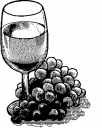
Each year, for the nine or so years I've been living here, summer has been 'killer' in part, and unexpectedly not-so-hot in other parts. Heat is a necessary state for raising sugar levels in grapes, and the sugar in the grapes is necessary for creating alcohol, and the alcohol sometimes creates heat of a different kind in turn.
We're in the middle of crush. The usual industrial winery noises are augmented these days by the intermittant whine of the bladder presses, the kachunks and heavy jangles of chains and wood against dragscreens, and the thunder of the grapes falling into the stainless steel tanks from above, pumped through must lines from the crushers. I'm on day shift now, sweating at the century mark. It's a killer part of this summer.
The 'dirty juice' is delicious no matter what variety of grape: chardonnay, zinfandel, merlot. I drink it from my own cupped hands. The drink is obscenely sweet and refreshing. I stand in the shade and drink. Afterward I run a one-inch hose until the water is cool, cold. I douse my face as I drink.
One problem is that the juice can have you running to the bathroom pretty quickly sometimes. You can't keep drinking it. Even before alcohol is brought forth, the stuff is powerful.
Carbon dioxide will buzz you to the point of pass-out, even death. Power: like heat, like alcohol, like sugar. Opening a tank's mandoor might literally knock one over unless it's done respectfully, carefully.
I feel like I'm in a rocker, trying to remember and re-tell stories significant to me, but half-forgotten. On top of this, today's my birthday. I'm nearing the half-century mark, and earlier this year the former Mrs. E. divorced me.
The summer really hasn't been killer, save for a small part so far. And this summer has not brought forth catastrophies like exploding tanks or out-of-control fermentation. No tremendous grape mess to speak of. It almost seems too easy, at least part of it does.
(See poetry in Slow Trains Volume 1
Sunday, September 02, 2001
Iowa City  On a late summer's day, when the temperature is in the mid-70s, the sun is out, and a slight breeze is whispering, no spot is finer than the W. Albert Cox memorial bench. I can't say who he was, or if there is more than one such bench. The brass plaque helps very little -- "In Loving Memory of," "1915-1999," but it's quite a bench. Dappled sunlight falls through from the trees surrounding it, yet it has a clear view of the Iowa River and the jogging path in front of it, and just the right level of low humming noise to be a spot unto itself, but not isolated. And it's quite a proud bench -- weathered, well planed hardwood on vinyl clad steel, curved just right to sit back and look out, then to read that book -- freshly scored from the bookstore -- that creates its own world, now forever linked to the dappled shade.
For the town itself, that oddly displaced patch of urban blight that battled a better prairie into sad submission, I've very few kind words to pass on, but I wholly commend to you the W. Albert Cox memorial bench.
(See article in Slow Trains Volume 1)
Thursday, August 30, 2001
the state of desire
They say that lust is a deadly sin, but how could this be so? Lust keeps you alive starts your day ends your night brings you love & keeps your passion bright. Perhaps God could replace the sin of lust with something wiser still -- say, overuse of the remote control. Lust creates children breeds devotion inspires great music brings you to your knees writes lyrical poems of joy and madness and sets your spirit free. Who ever wrote a sonnet about television?
(See fiction in Slow Trains Volume 1)
Monday, August 27, 2001
Batterymarch Street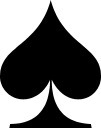 Bad Hand Bad Hand
It was a bad hand that Monday morning walking Batterymarch Street in front of Jimmy O'Keefe's. A deuce of spades, an eight & four of clubs, the Jack of diamonds, & a crushed pack of Marlboros. I could practically see them late the night before sitting at the high tables in front of the windows flung wide open, memorizing to the best of their abilities the bet, the pot, the winnings, & if any of them had a hand like that, the losses. Cezanne would have cramped up trying to portray that many cheap bottles of beer. Somebody flung what he got dealt last out the window in disgust, having to pay up from way down. Funny, though, on the way home from work I saw a few more cards as the cars changed spaces. There, tossed under the back wheels & trunk of one parked to the left of the bar, the Ace of clubs & the Ace of diamonds, as if one of the friends in the Sunday group wore the lure of long sleeves in the heat of a July night.
(See poetry in Slow Trains Volume 1)
Wednesday, August 22, 2001
Highway 17 Southbound out of Sault Ste. Marie -- past
Garden River, Blind River, Serpent River.
I'm going home. I've got these two transport trucks ahead, and they're really moving, pushing everyone on the road to go faster -- and we do. They bear down on the unsuspecting like something out of a Stephen King novel. The ones behind try in vain to pass. There are plenty of passing zones, but each time we reach one, they both pull out, blocking the way and when we get to the part where it merges back to one lane, we find ourselves in the same order that we started in. There is a divided highway with two lanes both ways just west of Sudbury...this is where we will make our collective move and pass them both. When we get there, right there, we find a detour. The local police, puffed up with importance behind their reflective sunglasses, wave us off down a side road. I lose the trucks and am soon lost myself.
Highway 69 looms out of nowhere and I am off again -- past Estair, Bigwood, Pointe au Baril.
I hit the farthest reaches of Highway 400 -- 3 lanes now both ways -- and up ahead I see them. The same
two trucks, still taking turns riding each other's tailwinds. But I've got them. I gain and blow past on the left. I couldn't be happier. I won. I would do a little dance if I could. I've been behind these guys for 600 kilometers -- now I'm ahead. I win, I win, I win.
"Slow down," he says. "You're going 160k."
I am stunned. I slow to 120k. I have spent the last week barely going over 60K.
It sneaks up on you; the speed, the noise, the urgency. The closer I get to the big city, the faster I go -- we all do.
Sunday, August 19, 2001
River City 
A storm is somehow more personal when you're walking, and therein lies the tale. This one blew up under cover of a grey-green sky after days of too-hot and too-humid-to-genuinely-enjoy summer weather. My discount store umbrella and I were trudging happily on our prescription walk under unmistakable storm watch clouds, guessing at the exact point the storm would catch us.
The storm teased us haughtily for nearly half a mile -- a drop here, a sprinkle there, umbrella up, umbrella down, umbrella up again, certainty of being drenched fading to conviction that we'd reach shelter in time to wait out the storm's fury, returning to certainty.
Then the storm arrived in all its frantic majesty. First a sustained gust of hot wind, bearing with it the unmistakable smell of the rain backing it, straining the resolve of the umbrella to hold up against it, even pointed properly to resist the wind. Then rain in sheets, wind veering to the right, then sheering to the left, the umbrella suddenly sprung clear out of shape, then fighting back to half its former silhouette, flapping ominously, but resisting with all its might. Twelve blocks to the first possible shelter at the gas'n grab up the road -- lightning, sizzling around us, thunder booming and receding, rain continuing in sheets, coming so quickly the gutters were filled and the storm sewers choking.
We arrived with exhilaration and great dignity at the glowing fluorescent shelter of the home of overpriced goods, the umbrella flapping crazily but proudly, me soaked but for a few square inches. Somehow I just couldn't resist quipping to the folks shivering under the overhang by the door. "Hey," I said, "I hear it may rain today."
Thursday, August 16, 2001
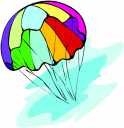 London LondonWhen I was in Miami I went skydiving for the first time. I was not terribly afraid, because I like to be lost in time & space -- transatlantic flights, scuba diving, long train trips -- any place where people can't easily find me. I went skydiving because I was at the World Air Games in June back near my childhood home in Andalucia, where there were freeflyers! cloud dancers! skysurfers!, and I wanted to be one of them.
When I jumped for the first time from 11,000 feet and was freefalling, it was a better rush than any drug, than any midnight club, than any dream I ever had about how things could be. By the time I landed I was, for that moment, everything I ever wanted to be -- the most powerul woman in the world, more seductive than the flamenco dancers I idolized as a little girl, stronger than my friend who climbs ice-covered mountains, and a graceful and brave maestro in la fiesta brava of my life.
Monday, August 13, 2001
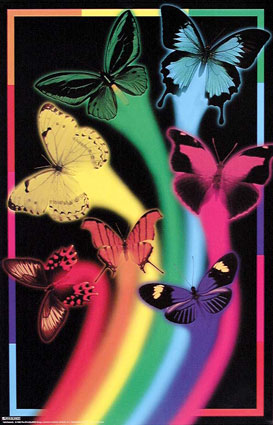 One I Wish I Could Name One I Wish I Could NameIn the next chapter a butterfly, one I wish I could name, black, & at just the right wingspan angle against the sun, a vibrant blue hue, lands on the silver granite. She rests. The frill of white lace, a little yellow & red at the edge proves she's a dancer, more abstract & beautiful than Sargent's El Jaleo. Her proboscis tongue licks salt off the stone. Sexy castanets serenading. Her dress flies up, black thong tugs at the long cleft between the small of her back to below belly. Toast a thimble of sherry. The desire to possess the unpossessable all dancers are. Did Nabokov kill butterflies? The inevitable arrives. She's setting out for home. Spain is a long way off. She flutters toward me, & with a quick, seductive glance behind a fan, leaps out across the vast Atlantic, the lightest ripple on the sea.
Friday, August 10, 2001
New Orleans
"There's a moon over Bourbon Street..." I can hear Sting crooning softly in my mind's ear as I look out my large hall window at Our Lady hovering over the New Orleans nightscape. Yes, it is Sabbat. The moon is hanging pregnant. Tomorrow she is completely full.
Ah, we are quite haunted here. You almost have to close yourself to it. It's a bit intense. You must visit sometime if you haven't already. This place is sacred, decadent, and ephemeral: in two hundred years we will be underwater. We are below sea level and sinking...a doomed Atlantis of the New World. Tomorrow night I will go into the Quarter, head first into humid night heat, and dance drunkenly, wildly under her gaze. It is my offering to the night, to Our Lady, and to my home. Sabbat ends tomorrow after Our Lady blooms. Like our fair city, she too, will soon wane.
Wednesday, August 01, 2001
Denver, Colorado:
Sunrise: 5:59 a.m.
"Inspiration move me brightly
light the song with sense and color,
hold away despair "
--Hunter/Garcia
Terrapin Station
I sit at sunrise in Silo Park before I begin meditating and let the questions and the ideas and the feelings of a new day flow slowly through my mind. I face west and sit with my back to the sunrise, watching the light begin to illuminate the Rocky Mountains in the distance. There are not many questions that truly matter in an ordinary life -- what are you most afraid of? what will you contribute to the world this day?… but today, one of my favorite questions stands out for me…What are you most excited about?
I often ask this question of teenagers that pass through my home -- what are you excited about? They tend to look at me in surprise, pause, say they don't know…but then they'll dig a little deeper, reach for the buried contemplative life of the mind, and come up with something that they are excited about, becoming momentarily a little wiser and happier for having considered the things that matter to them.
Today, I am excited that my Siberian Husky puppy can finally interpret the true meaning of stay…at least when she wants to. I am excited about learning the art of ritual drumming; excited to watch my oldest son enter his senior year in high school with confidence and optimism deep in his heart; excited that most days I can remember to slow down enough to sense the rhythm of sunrise and sunset.
But most of all, today I am excited about the launch of Slow Trains, and grateful to have the opportunity to bring out into the world some wonderful writing, ranging from the love of music to lyrical, prismatic poems. From Pamplona to Las Vegas, from baseball to Vietnam, with the humor of pigs in the bedroom and envelopes that speak, the premiere issue of Slow Trains travels into some of the most fascinating and vulnerable territories of our lives.
This Slow Trains journal, "Rave On," will be written by many correspondents from many locales, while at home, or on an adventure, and also in reflection of past and present journeys of the heart, the mind, and the body. The journal will be updated at least on a weekly basis, and often more so.
So, welcome aboard our literary adventure, and we are excited to have you here!
Read the earlier postcards in the archives.
|
|
 Rave On: postcards from Slow Trains
Rave On: postcards from Slow Trains
 Rave On: postcards from Slow Trains
Rave On: postcards from Slow Trains